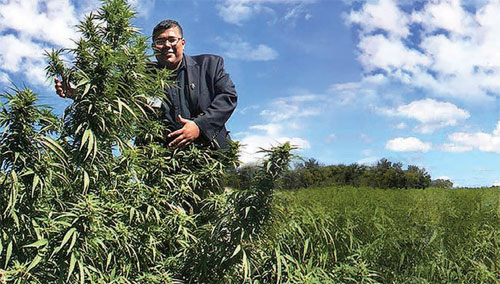By John Rogers
Aqueous Sciences of Nevada, a Las Vegas-based development company, made two moves last week that may lead to a major cannabis-growing operation on Navajo Nation reservation land in the Four Corners area that includes southeastern Utah. Aqueous has had an agreement in place with the Navajo Nation to be its exclusive agent for the management of companies wishing to cultivate hemp on Navajo Nation land.
Aqueous, a wholly owned subsidiary of Las Vegas-based One World Ventures Inc. (OWVI), was granted six provisional licenses to cultivate, process, retail and distribute hemp/cannabis products on reservation land by the Navajo Nation San Juan River Farm Board, the governing entity for agricultural activities on the reservation. The board-appointed Native American Agricultural Co. (NAAC) conducts the process by which the licenses are approved and granted. The provisional licenses allow Aqueous to proceed with a site selection and other steps to begin production.
“After submitting our business plan and application processing fee, there was some communication back and forth, questions we had to answer, but our applications were processed promptly and the provisional licenses were approved in less than four weeks,” said Amy Walters-Flagg, operations manager for Aqueous Sciences. “We are so pleased with this green light to move forward and get the physical site set up in order to complete the final two steps of the application process before receiving the full annual cannabis licenses — hopefully by the end of next month (April).”
Meanwhile, Aqueous Sciences has signed a memorandum of understanding with MYM Nutraceuticals Inc. of Vancouver, British Columbia, to form a partnership to grow 3,000 acres of cannabidiol-rich hemp (CBD) on Navajo Nation land in the Four Corners area. Part of the land under consideration lies in Utah but no specific farming location has been announced by the two companies. CBD is a naturally occurring compound found in the resinous flowers of cannabis, which is gaining popularity for medical applications such as pain relief.
MYM and Aqueous will incorporate a new company for the purpose of cultivating, extracting and distributing hemp products. MYM and Aqueous will each own 50 percent of the company. MYM and Aqueous said their hemp cultivation will comply with Navajo Nation, USDA, FDA and FTC regulations and requirements.
“With the recent passing of the farm bill in the U.S., CBD-rich hemp was removed from the classified drug list, opening the door for farmers to legally grow hemp,” said Howard Steinberg, CEO of MYM. “Our partnership with Aqueous is in keeping with our new strategic plan to become a global leader in the cultivation, extraction and distribution of hemp and CBD in bulk and for use in our own unique branded products.”
MYM and Aqueous will each fund the venture with an initial investment of up to $1 million for operating and capital costs. Aqueous will provide all labor, site management and other resources as necessary to operate the business. Aqueous will also handle licensing, regulatory approvals and compliance. Last week’s receipt of provisional licenses from the NAAC was a step toward beginning production, company officials said.
MYM will provide expertise and support in growing procedures, import/export facilitation, access to its research and development team and distribution, the company said.
The 2018 Farm Bill passed by the U.S. Congress requires that Native American tribal organizations have regulations in place that include procedures for information collection, land use, testing, effective disposal of plants and products and compliance with law enforcement in order to begin cultivation of cannabis on tribal lands. The regulations also require annual inspections and submission of data to the USDA. The NAAC was established by the Navajo Nation to oversee the process and has filed the necessary paperwork with the USDA to begin cultivation. The American Indian Agricultural Regulatory Agency (AIARA) will be regulating and monitoring the Navajo Nation’s venture into cannabis cultivation.
In 2018, the NAAC completed a successful hemp cultivation pilot program on the Navajo Nation using native farmers which resulted in producing millions of high-quality full-spectrum hemp seeds on local farms, according to Dineh Benally, president of the San Juan River Farm Board.
“As a sovereign tribal nation, we are self-governed, but have modeled our rules after the proposed criteria set out in the 2018 Farm Bill, which, for the first time, includes tribal nations,” said Benally. “We are in support of these rules and have already submitted our hemp regulations to the USDA for approval to retain our primary regulatory authority over hemp and cannabis production on our native lands.”
Aqueous and MYM are rushing to complete the steps required by the Navajo Nation to begin its farming project and had hoped to be in at least limited production during the 2019 growing season, but the USDA has announced that any rules they release for the cultivation, processing, manufacture and distribution of hemp will not be implemented until the 2020 growing season.
Hemp is touted to have many uses, including health food, medicine, paper and textiles. Experiments are underway to use hemp to produce plastics and fuels. The plant is said to use very little water or nutrients to grow and because it is technically classed as a weed, it is easier to cultivate than most crops, making the arid Southwest a viable site for its cultivation.








